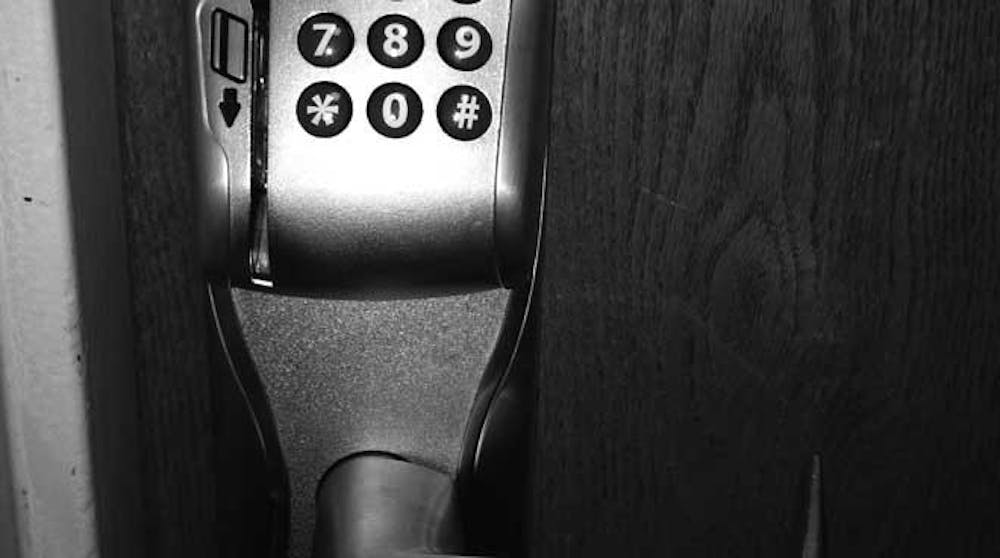New electronic dorm-room locks were installed in Lora Robins Court during the summer, allowing residents to open their rooms with only their Spidercard and a pin code.
Starting in September, each resident was able to program her room's device to recognize her Spidercard and a pin that she assigned to it. And, if a resident does not have her Spidercard, she can just use her cellphone.
First-year roommates and residents of Lora Robins, Sally Hu and Moira Lachance said they had especially enjoyed that aspect of the system. Because she registered her phone on Bannerweb, Hu can text "Open my door" to a certain number, and she will receive a response telling her to try her pin and open her door, she explained.
"Then, you don't even need to carry this all the time," Lachance said, holding up her Spidercard.
But, the new devices were installed with more than convenience in mind. The change to electronic locks should decrease maintenance costs as well, said Paul Lozo, the assistant director of operations and maintenance. Without keys, Lozo said, the need to make new keys and change locks disappears.
Lozo said representatives from the University Police Department, One Card services, student development, information technology and facilities had all been involved in making the decision to install electronic locks.
After 18 months of discussion, these committee members made the decision to start a pilot program in Lora Robins because its hardware was due for replacement, Lozo said.
Thus far, from the maintenance standpoint, the program has been a success, Lozo said.
The University Police Department has also been pleased with the change, Captain Beth Simonds said. "It's our understanding that the locking system will make the building more secure," she said, adding that she was impressed by the security of the cellphone technology.
For resident assistants in Lora Robins, the new locks have also been a positive change. Sophomore Meagan Rodriguez, an RA in the basement of Lora Robins, said her lockouts had been reduced dramatically since the electronic locks had been activated.
But, since the devices are battery operated, several residents have been locked out of their rooms because the batteries have expired, Rodriguez said.
Maintenance thinks these lockouts were caused by bad batteries, Lozo said, and that they should last for about a year.
Enjoy what you're reading?
Signup for our newsletter
But, leaving your door open will drain the battery faster, he said, explaining that since the device is communicating that the door has been left open to the computer system, it is using more power. As a result, Hu and Lachance said they had received emails telling them to keep their door closed.
"That's something that I really dislike as an RA -- that they can't keep their doors open," Rodriguez said. "That's part of being on a hall."
As for Hu and Lachance, they keep their door open anyway, using a pink ribbon to tie the door handle to a towel rack. Other residents have done the same, they said.
Maintenance workers have been receiving weekly battery reports, Lozo said. "That is something that we are watching," he said. "Because it's a new system, we're not sure how things are going to play out."
But, the committee members had expected to find problems in the system. And, with the overall reaction to the new devices being so positive, the pilot program is expected to continue, he said.
While plans have not been finalized, Lozo said the committee hoped to add another dorm to the program in 2015, and Dennis Hall is a front-running option.
Contact staff reporter Katie Branca at katie.branca@richmond.edu
Support independent student media
You can make a tax-deductible donation by clicking the button below, which takes you to our secure PayPal account. The page is set up to receive contributions in whatever amount you designate. We look forward to using the money we raise to further our mission of providing honest and accurate information to students, faculty, staff, alumni and others in the general public.
Donate Now



